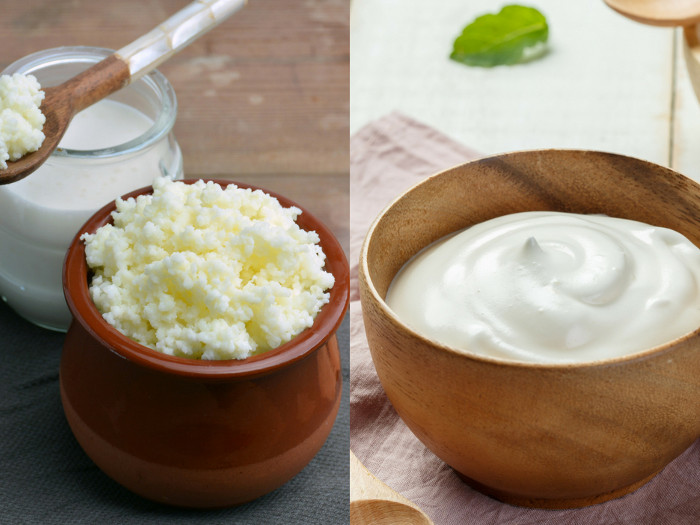Fans of kefir and yogurt will praise the probiotic powers of both, but which is really better for you?
Kefir vs Yogurt
As we all know yogurt is a fermented milk product that is consumed all over the world as a source of protein and probiotics. On the other hand, kefir is a fermented milk drink that resembles a thin yogurt drink.
How are They Made?
- Yogurt: It is made from cow’s milk that has been heated, with two strains of bacteria added, Lactobacillus bulgaricus and Streptococcus thermophilus.
- Kefir: It is also made from milk. But instead of heating the milk, cultured kefir grains are added to it at room temperature and then left to work for up to 18 hours.
Nutrition
- Both kefir and yogurt are good sources of calcium, potassium, and B vitamins.
- Both provide, on average, about 9 grams of protein.
- Because kefir is cultured at room temperature, it can have three times as many probiotics as yogurt. [1]

Both kefir and yogurt are rich in probiotics but one is higher than the other. Photo Credit: Shutterstock
Consistency
- Kefir that has not been cultured enough will look like regular milk. Kefir that has been cultured properly has the consistency of buttermilk.
- Yogurt is thicker, with a smooth, custard-like texture.
Taste
- Both kefir and yogurt are sour and tangy.
- Often, yogurt is sweetened with fruit or honey.
- Kefir may also be sweetened, but still retains its original tanginess.
Health Benefits
- Live culture probiotics support a healthy immune system and keep your digestive tract running smoothly.
- Yogurt and kefir are recommended for the treatment of diarrhea or inflammatory bowel disease (IBD). [2]
- As a result of the fermentation process, kefir is mostly lactose-free, making it a great option for people who are lactose-sensitive.
Side Effects
- Yogurt has very few side effects but can cause stomach problems or a skin rash in rare cases.
- Some of the side effects of starting to drink kefir can include bloating, constipation, or abdominal cramping.
Which is Better?
If you’re looking for more probiotics in your diet, kefir has more of the active “healthy” bacteria. However, if you’re concerned about taste, yogurt is a great source of protein without the thinness of kefir, and still provides some probiotics to aid gastrointestinal health. [3]
